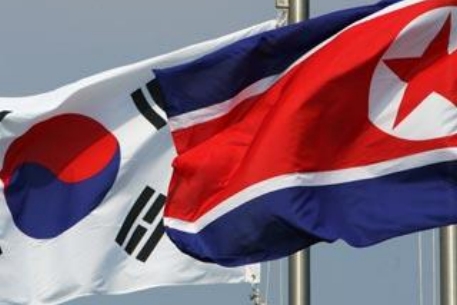Is Peaceful Korean Unification Possible?
New York Times
12 ديسمبر 2014

After decades of dreaming of a reunified North and South Korea, many South Koreans, young people in particular, now see unification as irrelevant or too costly. This gives urgency to the effort by Park Geun-hye, president of South Korea, to boost domestic support for unification and lay the practical groundwork to make it happen.
The dream is at once quixotic and prudent. On the one hand, it is hard to imagine the North’s leader, Kim Jong-un, voluntarily giving up his family-run dictatorship. On the other, recent Middle East history has shown how quickly borders can shift and regimes can crumble. If that should happen on the Korean Peninsula, leaders there and elsewhere in the region must be prepared to manage a hugely complex and disruptive transition.
As part of her initiative, Ms. Park has named a 50-member commission — including private-sector experts, government officials and the heads of six state-run research institutes — to develop a vision of what a unified Korea might look like, as well as road maps for getting there. In the best case, peaceful reunification would reunite long-separated families, free 24 million North Koreans from dictatorship, enhance regional security and eliminate North Korea’s nuclear threat. Unfortunately, other outcomes seem more likely: the continuation of the present hostile impasse, or, conceivably, the violent collapse of the North Korean regime.
A key player in the peninsula’s future will be China, the North’s chief political patron and the source of its fuel and food imports. Fearful of chaos on its border, China has long refused to exert the kind of pressure that would force radical change in Pyongyang. But China has recently shown more willingness to listen to South Korea on the unification issue, a good sign since Beijing’s cooperation in managing that process would be essential.
Ms. Park is the latest South Korean president to push for unification. But as the differences between the countries harden and younger generations of South Koreans lose interest, she may also be the last.
 عن أمل جنبلاط المتجدد: لبنان يستحق النضال
عن أمل جنبلاط المتجدد: لبنان يستحق النضال
 صحافيون أم عرّافون!
صحافيون أم عرّافون!
 ماذا يجري داخل أروقة بيت الكتائب المركزي؟
ماذا يجري داخل أروقة بيت الكتائب المركزي؟


 عن الخرائط التي تُرسم والإتفاقات التي تتساقط!
عن الخرائط التي تُرسم والإتفاقات التي تتساقط!
 “الإنحراف في الحياة”/ بقلم كمال جنبلاط
“الإنحراف في الحياة”/ بقلم كمال جنبلاط
 هاشتاغ #صار_الوقت يحل أولاً في حلقة جنبلاط
هاشتاغ #صار_الوقت يحل أولاً في حلقة جنبلاط
 طاولة نقاش عن أزمة الصحافة في جامعة AUST
طاولة نقاش عن أزمة الصحافة في جامعة AUST
 عبدالله: ليظهر لنا وزير مكافحة الفساد حرصه في صفقات البواخر والفيول
عبدالله: ليظهر لنا وزير مكافحة الفساد حرصه في صفقات البواخر والفيول
 عبدالله: غريب أمر وزارة مكافحة الفساد!
عبدالله: غريب أمر وزارة مكافحة الفساد!

 Comment to Uri Avnery: How Sad What Is Looming Ahead
Comment to Uri Avnery: How Sad What Is Looming Ahead
 “Not Enough!”
“Not Enough!”
 … لمن لم يقرأ يوسف البعيني/ بقلم وسام شيّا
… لمن لم يقرأ يوسف البعيني/ بقلم وسام شيّا
 كمال جنبلاط في مولده الأول بعد المائة: تعاليمه وأفكاره ما زالت الحلّ/بقلم عزيز المتني
كمال جنبلاط في مولده الأول بعد المائة: تعاليمه وأفكاره ما زالت الحلّ/بقلم عزيز المتني
 رئيس حزب/ وليس (… سابقاً)/ بقلم د. خليل احمد خليل
رئيس حزب/ وليس (… سابقاً)/ بقلم د. خليل احمد خليل
 التوازن السياسي في لبنان
التوازن السياسي في لبنان
 لبنان… مشاريع انقلابية مؤجلة
لبنان… مشاريع انقلابية مؤجلة
 جنبلاط وحَمَلة أختام الكاوتشوك
جنبلاط وحَمَلة أختام الكاوتشوك
 Le Liban est un symbole de tolérance
Le Liban est un symbole de tolérance
 Our Automated Future
Our Automated Future
 The True Origins of ISIS
The True Origins of ISIS
 Les Misérables vs. Macron
Les Misérables vs. Macron
 عذراً أيها المعلم/ بقلم مهج شعبان
عذراً أيها المعلم/ بقلم مهج شعبان
 رساله الى المعلم / بقلم ابو عاصم
رساله الى المعلم / بقلم ابو عاصم
 إلى روح القائد والمعلم كمال جنبلاط/ بقلم أنور الدبيسي
إلى روح القائد والمعلم كمال جنبلاط/ بقلم أنور الدبيسي
 أسرار وعناوين الصحف ليوم الجمعة 14 كانون الاول 2018
أسرار وعناوين الصحف ليوم الجمعة 14 كانون الاول 2018














